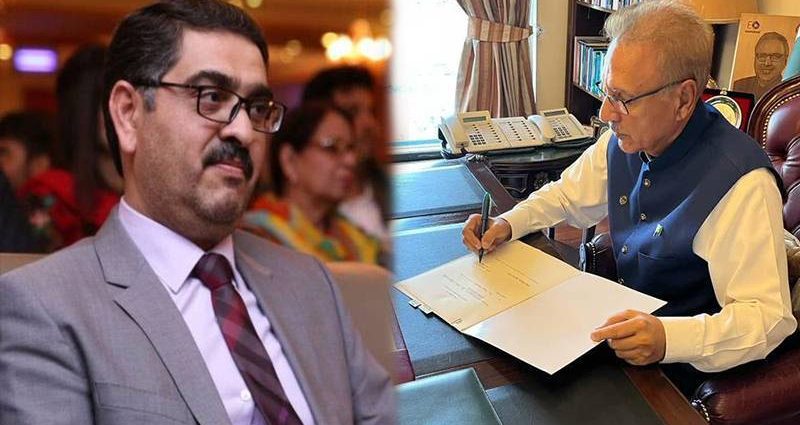Senator Anwaarul Haq Kakar will take oath as caretaker prime minister of the country on 14th August.
Senator Anwaarul Haq Kakar will perform duties as 8th caretaker prime minister of the country.
ISLAMABAD ( Web News )
Senator Anwaarul Haq Kakar will take oath as caretaker prime minister of the country on 14th August. President Dr. Arif Alvi will administer oath to him during the ceremony going to be held at Aiwan-e-Sadr on Monday afternoon.
Meanwhile in a statement issued on twitter, nominated caretaker prime minister Anwaarul Haq Kakbar said that he is thankful to Almighty Allah for giving him opportunity to serve the nation as caretaker prime minister. Anwaarul Haq Kakar said that with the blessings of Almighty Allah he will do every best deed which will be in favor of Pakistan.
Senator Anwaarul Haq Kakar will perform duties as 8th caretaker prime minister of the country.
The nominated Caretaker Prime Minister, Senator Anwaarul Haq Kakar hails from Qilla Saifullah, Balochistan. Anwaarul Haq Kakar born in 1971 in Muslim Bagh area of Balochistan.
He was elected to the Senate in 2018 and has been a very active politician.
He has worked as chairperson of the Senate Standing Committee on Overseas Pakistanis and Human Resource Development, and as a member of the Business Advisory Committee, Finance and Revenue, Foreign Affairs and Science and Technology.
He also served as the spokesperson of the provincial government prior to his election to the upper house in 2018.
Senator Anwarul Haq Kakar is widely regarded as a great intellectual in the country. He holds a Master’s degree in Political Science, Sociology and is an alumnus of the University of Balochistan.
The President approved the appointment under Article 224 (1) A of the Constitution. The summary regarding the appointment of Senator Anwaarul Haq Kakar as Caretaker PM was sent to the president by Prime Minister Mian Muhammad Shehbaz Sharif and Opposition Leader Raja Riaz Ahmed Khan.
The country is set to witness its most empowered interim setup ever with designated Caretaker Prime Minister Anwaarul Haq Kakar taking the reins as the eighth interim premier as the country prepares to navigate through a transitional period amid economic and political crises.
Kakar’s appointment comes under highly favourable circumstances, granting him unprecedented authority in the position.
Traditionally, the primary responsibility of the caretaker government has been to manage the day-to-day affairs of the country until the newly elected government assumes power. However, the interim government was empowered to take the role of economic stewardship after a joint parliamentary session on July 26 this year amended Section 230 of the Election Act, 2017.
The amendment now allows the caretaker government to exercise unusual powers pertaining to ongoing projects, and programmes, and even make crucial policy decisions, in addition to handling the regular affairs of the state.
As the country heads towards an interim government, it may not be a usual transitional government due to unprecedented political and economic challenges.
Above all, the interim government will also have to ensure compliance with the ongoing IMF programme. It is imperative, however, to take care of the commitments and assurances that the Government of Pakistan has given to the IMF during the last review.
Analysts have noted that the interim government may be in a better position to implement some of the committed policy actions that the current one may not feel comfortable with, due to the political cost of such actions.
The first formation of an acting government in Pakistan took place before the 1990 elections, and subsequently, all elections held in the country until 2018 were under the supervision of caretaker governments. The only exception was the 2002 polls, which were conducted under the authority of military ruler Gen (retd) Pervez Musharraf’s government without the formation of a separate caretaker setup.
For the first time in Pakistan’s political history since the 1977 polls, there has been a demand for caretaker governments to oversee general elections. Thus far, a total of seven interim governments have been established, and the upcoming formation will mark the eighth.
Ghulam Mustafa Jatoi was the first caretaker prime minister of the country, serving from August 6, 1990, to November 6, 1990.
Mir Balakh Sher Mazari, the second caretaker prime minister, served from April 8, 1993, to May 26, 1993. He was the Mazari tribe’s 22nd ‘Sardar’ and seventh ‘Mir’.
Moeenuddin Ahmad Qureshi, a seasoned economist, held the position from July 18, 1993, to October 19, 1993. His tenure was marked by extensive reforms backed by an IMF standby arrangement, and a focus on tackling tax evasion and loan defaults – fostering a “payment culture”.
Malik Meraj Khalid, a philosopher and left-wing statesman, was the fourth caretaker prime minister, serving from November 5, 1996, to February 17, 1997.
He was appointed as the caretaker prime minister after the government of former prime minister Benazir Bhutto was dismissed in November 1996. His efforts to rally anti-Benazir forces contributed to the victory of Nawaz Sharif’s PML-N in the 1997 elections.
Mohammedmian Soomro, the fifth caretaker prime minister, held the position from November 16, 2007, to March 25, 2008. Prior to this role, he served as the Senate chairman and later became the caretaker president after General Musharraf stepped down.
Justice (retd) Mir Hazar Khoso, a highly respected figure, served as the sixth caretaker prime minister from March 25, 2013, to June 5, 2013.
Khoso remained fairly uncontroversial and maintained a distance from politics. Because of the respect and trust he enjoyed from Baloch nationalist leaders and separatists, the then-ruling PPP considered him a pivotal asset in connection with forging national unity. Khoso died on June 26, 2021, at the age of 91.
Justice (retd) Nasirul Mulk, nominated as the chief justice of Pakistan by former Prime Minister Nawaz Sharif, held the position of the seventh caretaker prime minister from June 1, 2018, to August 17, 2018. He is fondly remembered for his exercise of judicial restraint.

